Changing the Mindset
from Individual Contributor to
Team Leader
Are Organizations doing enough?
Category: Learning Journey
Client: Leading IT Major

Congratulations! You have been promoted.
A message that every employee strives to achieve! A wonderful experience to be incharge of your set goals, yet so nerve-wracking to lead a team to promising heights.
In the fast-paced world today, it is not uncommon to see individual contributors being promoted to managerial role with barely any preparation. No doubt in the absence of formal training, the leap can sometimes be intimidating. At this particular juncture, there are multiple contradicting schools of thought. One school puts forward the argument that each individual manager should actually build their own skills. If people aspire for managerial positions, they should ready themselves. While the another school counters it with the hard-hitting fact that the growth of the company goes hand-in-hand with the growth of its people. If the organization is targeting to strengthen its core employee base, it needs to first equip its frontline managerial champions with the right capabilities to act as primary guides. A 2014 survey of Gallup shows that managers account for at least 70% of variance in employee engagement scores across business units. This variation is in turn responsible for severely low worldwide employee engagement. Obviously the impact is huge!
So what really changes? What hinders the smooth transitioning of roles? The answer is hidden in the basics of how the roles are described and what expectations are set from the employee. An individual contributor (IC), as the name implies, is a professional employee without management duties who works independently in support of an organization’s objectives and mission. Being in charge of people is indeed a big step up from being a solo contributor. What helped the employees succeed as individuals may not help them succeed as managers. They will need to unlearn and relearn former skills and adopt the mindset of a manager.
Why it’s not so easy
Adopting the Manager Mindset becomes the primary stepping stone for the employee.
So what exactly does this mean? Manager Mindset basically refers to replacement of Me-first with We-first attitude. It entails changes not just in roles and responsibilities but also in the dynamics of relationship management, time management and creative freedom. Initiating and adhering to this change is indeed a daunting task for the employees.
As the saying goes, old habits die hard, many a time employees fail to make conscious efforts. They end up needing adequate nudges in the right directions. The bosses, who are one level above, can nudge them using tried and tested method of continuous feedbacks.
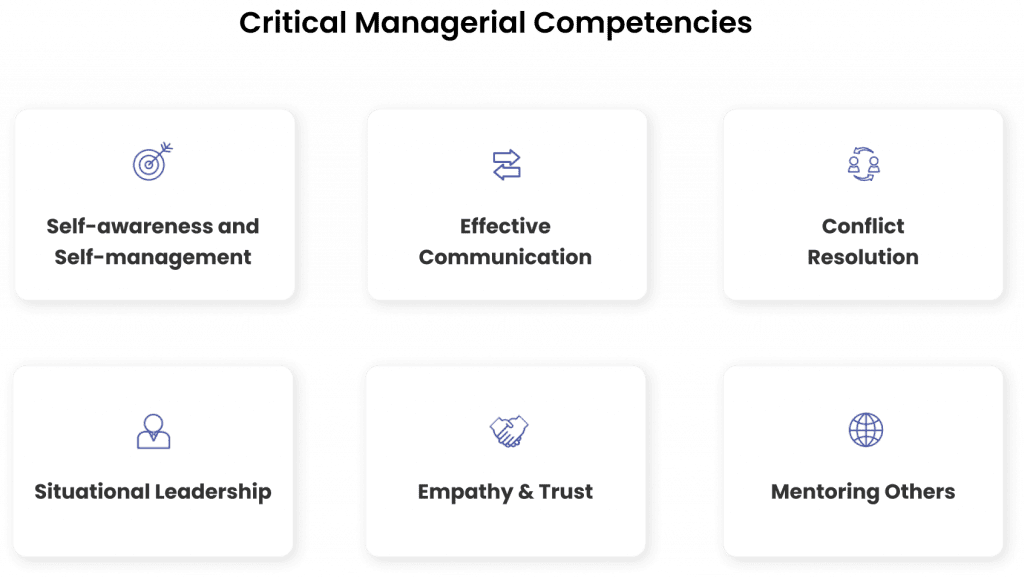
Individual Contributor
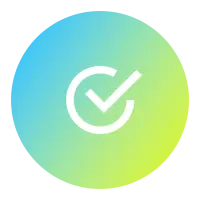
Responsible for planning for own timeline.

Expected to provide individual deliverables.

Technical or functional focus.
First time managers

Achieving results through others.

Help others plan their career goals.

Set goals, Delegate tasks and provide feedback
to entire team.
What organizations are doing to address this
While the need for training the first-time managers is evidently immense, are organizations
doing enough to address the hype and gap?
If you survey the annual learning calendars across organizations, you would notice that leadership trainings are being listed for sure. But quite a fair amount of them fail to be targeted in their intent and approach.
A recent article published in HBR, stated the fact that while the average age of people stepping into managerial/supervisory roles is 32. Yet it’s about after a decade of managing people, they receive company sponsored formal training. Leadership training for new managers often takes a backseat owing to time scarcity and work pressure. They are left to fend for their own in most cases, which, in the long run, proves detrimental for the business.
When do managers first get Leadership training?
On average about 42-
After 10 years after supervising people
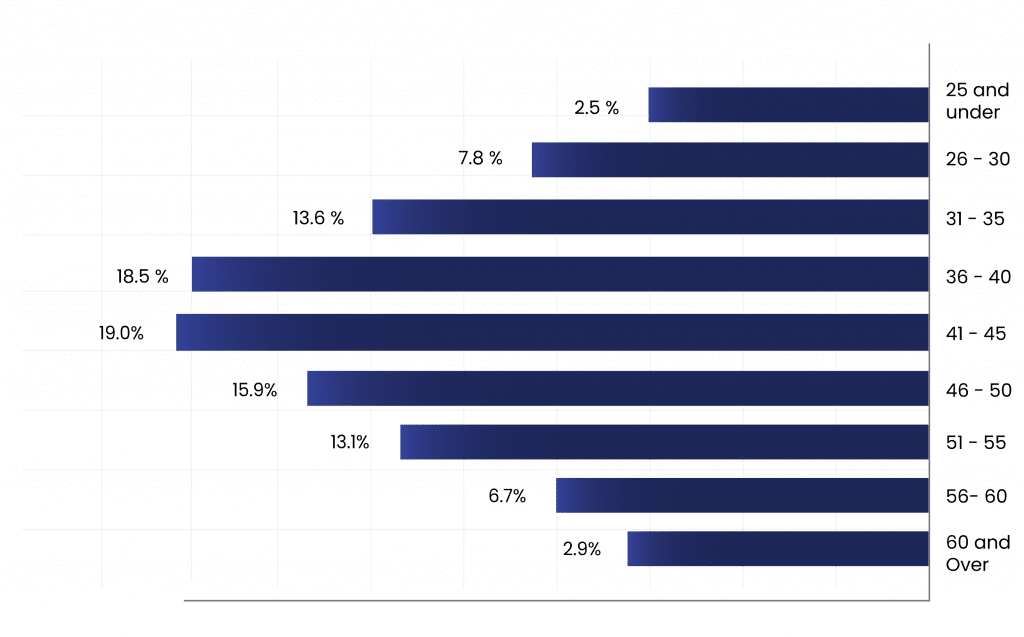
SOURCE: ZENGER/FOLKMAN TRAINING DATABASE

The Industry Buzz

As someone operating in digitally disrupted banking sector, we not only focus on role readiness, but on change readiness and leadership readiness as well!

Control freaks people! Let go and focus on building a Culture of Trust! Strengthen your local management teams if you want to build excellence on a global level!

From an IT industry perspective, building managerial capability is critical. Only Great Managers can ensure Great Employee Engagement and in turn, greater achievements!

It’s like a cricket test match! You have to get comfortable with the idea of things happening overnight. And that’s where you would need Resilience, Self-confidence and in tune with recent times, off course Empathy!
Challenges we hear
Given the unprecedented challenges of recent times, it’s commendable to see many organizations striving to not just train their people with new skills but also prepare them with right capabilities, be it as simple as analytical decision making or as complex as transformational leadership. Many are seeking external channels to instrumentalize their objectives. However, the task is quite herculean considering the innate challenges restricting the design and delivery of learning programs.
It’s commendable to see many organizations striving to not just train their people with new skills but also prepare
them with right capabilities.
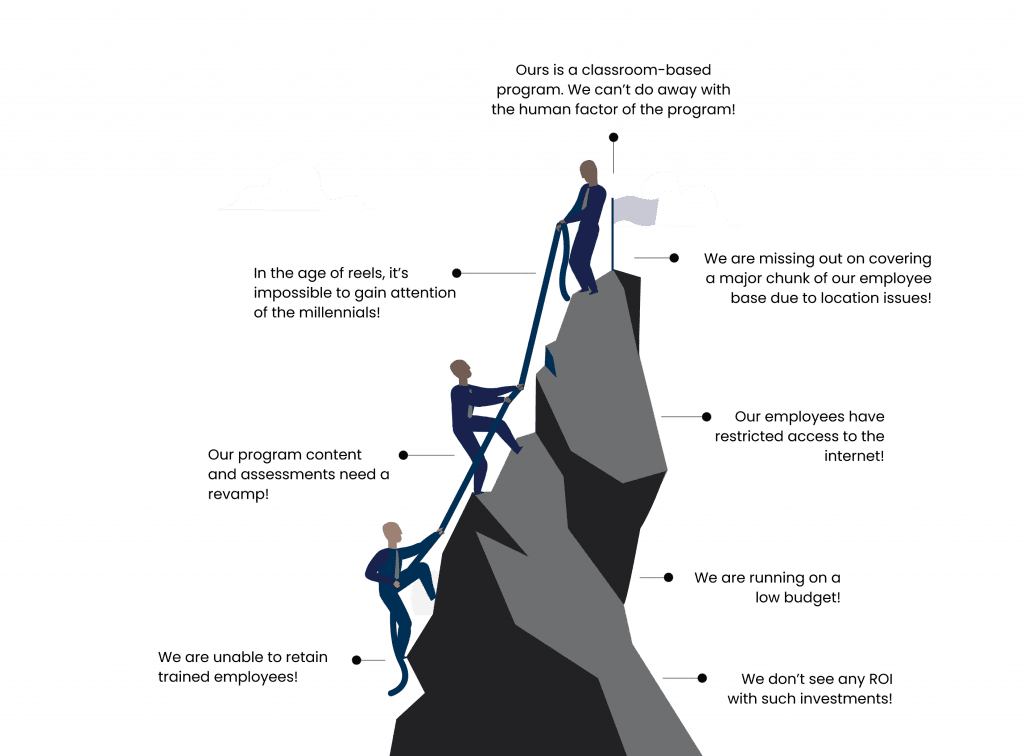
How we helped a leading IT major revamp its Capability Development Program for First-time Managers.
One of our leading clients, who is a global IT major, have been running an internal program for First Time Managers. This was a classroom-based program and was covering 1/10th of the actual cohort of employees who were being promoted to managerial position
globally. The numbers aimed at 4000+ prospective participants based in 40+ countries per year. Most of them were based out of client choices. Most of them did not have access to external sites due to their nature of work. The program lacked a proper qualitative structure, one that would justify the utmost importance of it and actively engage a primarily millennial audience. So, this gap of low reach prompted discussions around how to scale-up the program globally, of-course with a low turnaround time, tight logistics and budgetary constraints. This was the central issue put upfront the Think Talent team. We went on to have extensive consultations to understand their organizational culture and challenges as well as how they did not want to miss out on the human touch-point factor. After multiple considerations, we designed a comprehensive and innovative intervention in which cohorts of participants would undergo a shared learning journey. The features of the same are as follows: The transition from an Individual Contributor to a First Time Manager is a pretty enervating experience.
The frontline managers play a crucial role in employee engagement and championing innovation. So how do we better equip our People with the right skills and perspectives to ensure a smooth transition?
Designing the intervention
This was the central issue put upfront the Think Talent team. We went on to have extensive consultations to understand their organizational culture and challenges as well as how they did not want to miss out on the human touch-point factor. After multiple considerations, we designed a comprehensive and innovative intervention in which cohorts of participants would undergo a shared learning journey. The features of the same are as follows:
While the majority of the program was designed to be delivered virtually, it used a unique pedagogy that combined online self-learning with facilitator-hosted interactive sessions, virtual assessment centres, and other activities inclusive of feedback to provide a more immersive experience to participants.
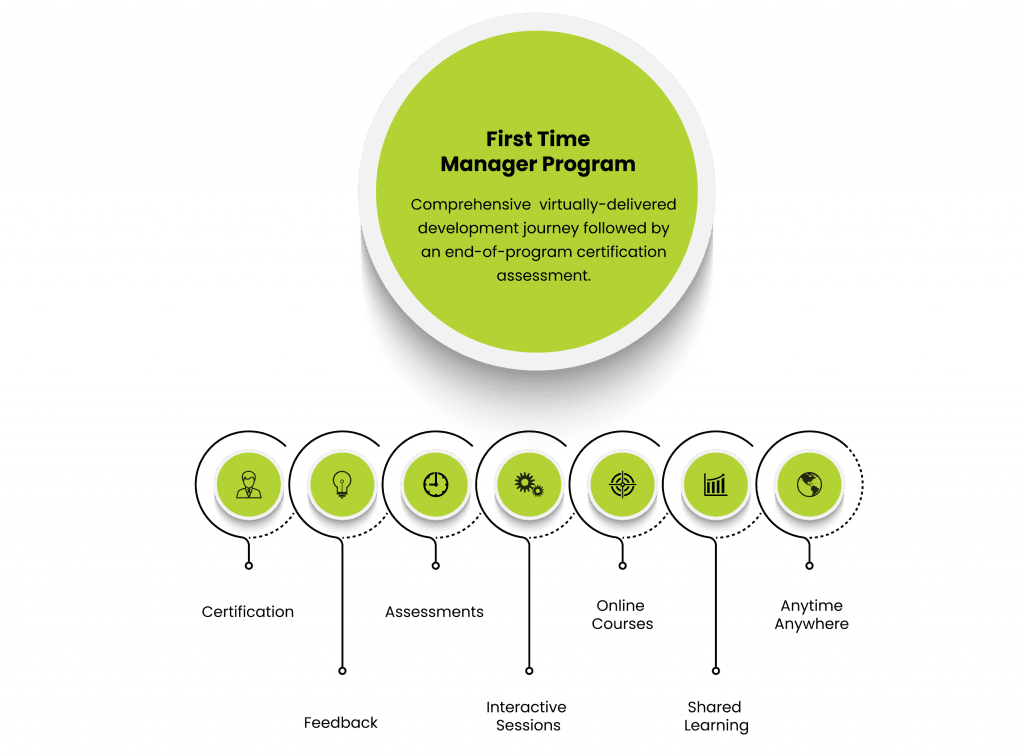
The program aimed at continuous engagement with the participants through learning, activities, discussions and feedback. The above image depicts the program flow, based on which clear structured communication channels were laid out. The playbook essentially comprised of Learning about leading Self, Learning about leading Others and a final certification assessment.
Leading Self
Comprised of self-awareness assessment, online courses, interactive sessions and in-basket exercise.

Leading Others
Comprised of leadership courses and multiple interactive sessions.

Assessment
Final assessment conducted virtually, consisting of Case Studies, Quizzes; followed by individual reports
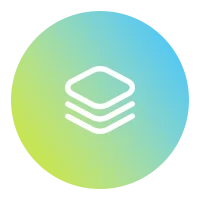
Certification
Individual Certification after successful completion of program
How The Program Evolved
Over the years, we continuously worked together with the client team to analyse performance results, behavioural insights as well as feedback received, with a common aim of improving the program features. Aforementioned are few milestone feature enhancements done:
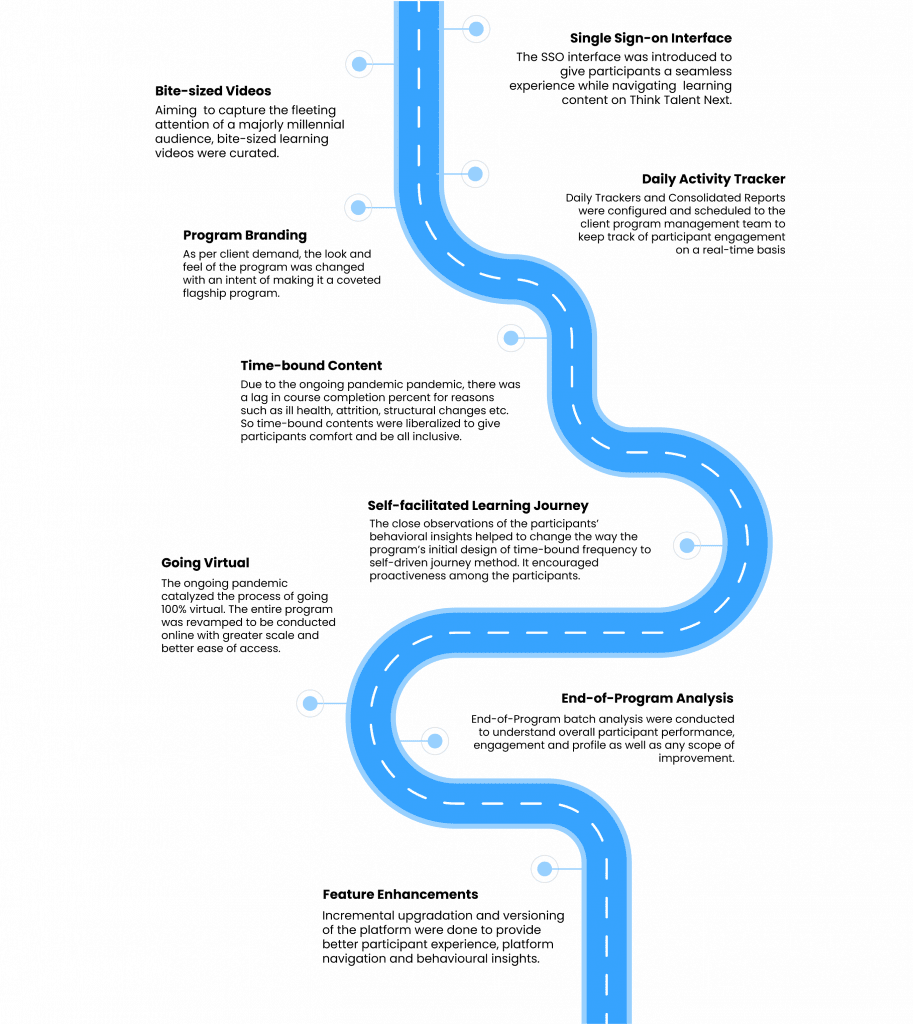
The Journey so far
Our partnership with the client started from April 2019 with launch of a Pilot Batch consisting of 100 participants. We deployed the hybrid model inclusive of both previous and new design aspects of the program.
The program was successfully concluded in 4 months and feedback received was highly positive. We went on to launch the program for the first batch in August 2019 and subsequently, for other batches as well sequentially. During the launches, we kept on working on design and delivery methodology. Owing to ease of scale and deployment, we decided to make the program completely virtual in 2020. In fact, the shared learning journey was fully actuated in October 2020.
What started as a HR-driven learning journey, became a self-driven one and gave the participants immense comfort in learning speed and retention. As on date, the program has become a flagship learning program for the client and is embedded in annual learning calendar.
A Timeline Of
Learning Journeys
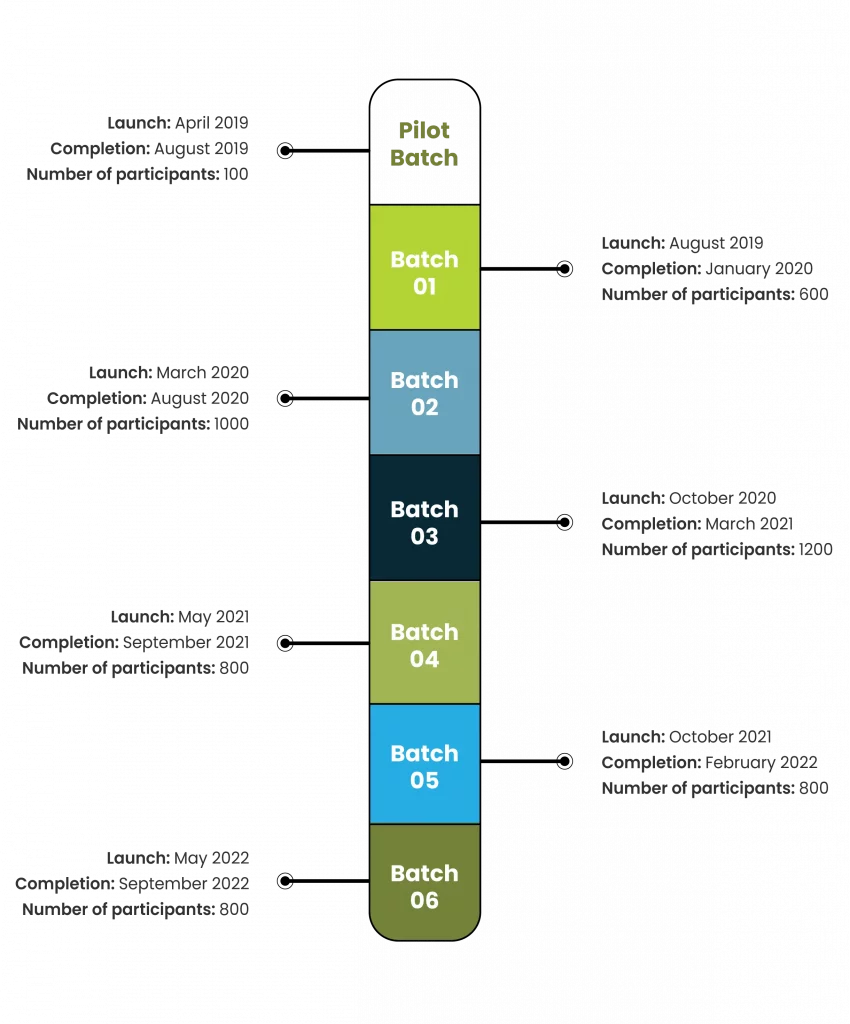
Success Metrics
We believe that successful virtual learning programs focus on learner-centric design & leverage technology to craft seamless experiences with a fair degree of personalization for each participant.
Establishing Relevance

Personalization at Scale

Seamless Experience
4500+ Participants
We enabled the client team to cover and certify 4500+ employees over the calendar years through the Program.
Learning Calender
Due to continuous feature
enhancements, we observed
a steady improvement in
participant performance over
the years. Notably, the year
2021 saw the highest
percentage of high scorers.
Performance Increment
The program is now deeply
embedded in the annual
learning calendar based on
the success of the initial pilot
batch.
40+ Countries
We enabled the client to scale up from covering from one country to participants from 40+ countries across time zones.
80% Completion rate
From a Participant Engagement point of view, more than 80% of the participants enrolled in the program were active participants and went on to successfully complete the program.
Looking Into The Future
From a futuristic perspective, one has to be cognizant of the ever-changing nuances of learning and development sector. Even at present, one can ponder upon multiple facets of the same program and discover areas of improvement. Few pointers are mentioned here as well. In fact, promotion based solely on performance should be discouraged as a practice.
One should consider the primary career anchors of the individuals before promotion, or even hiring into a particular role. This will help in timely building of a quality talent pipeline. Managers should be taught to handle direct reportees with task-relevant maturity, i.e., be hands-off or hands-on based on their performance. The future, no doubt, looks promising with more and more organizations opting to invest time and resources in building the right set of leadership capabilities.
As they say-
The Talent Pyramid will stand strong and brave the abrupt changes in the business landscape, if only its
foundation of frontline managers is resilient enough.

Course completion can be attributed to percent completion of e-learning materials. This will ensure participants don’t skip through relevant content.

Behavioral nudges, in the form of improved communication strategy and learning blended with trending topics, can be used to improve participant engagement.
Validation in terms of interest, eligibility, recommendation and so on can be used to ensure all enrolled participants are completing the courses in due time. Forced nomination should be avoided to reduce dropout rates.
Connect with us
For Proposals:
info@thinktalentindia.com
+91-8828158509
For HR & Admin queries:
hr@thinktalentindia.com
+91-9810780846
For Technical Support:
support@thinktalentnext.com
© 2024 Think Talent Services Pvt Ltd. All rights reserved.

